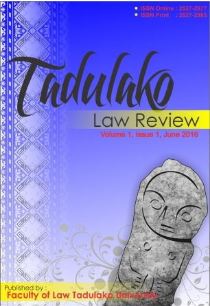THE ROLE OF THE DEBTOR'S LEGAL ACTIONS THAT ARE DETRIMENTAL TO CREDITORS AS AN OBJECT OF OTHER LAWSUITS IN BANKRUPTCY (ANALYSIS OF DECISION NO: 8/PDT.SUS-OTHER LAWSUIT/2023/PN-NIAGA SBY JO. NUMBER 17/PDT.SUS-PKPU/2022/PN-NIAGASBY)
Keywords:
Bankruptcy, Other Lawsuits, Share DilutionAbstract
In connection with a receiver's duty to secure bankruptcy assets, a receiver also has the authority to file a lawsuit or claim in connection with a bankruptcy assets dispute, whether in the form of an actio pauliana or other lawsuit. As in decision Number 8/Pdt.sus-Gugatan others/2023/PN-Niaga Sby jo. Number 17/Pdt.Sus-PKPU/2022/PN-NiagaSby, the receiver filed a lawsuit against the actions of a debtor who approved an increase in capital in a company because it was not carried out with the approval of the management as regulated in Article 240 paragraph (1) UUK-PKPU. The actions of bankrupt debtors are considered detrimental to creditors in bankruptcy because their actions result in share dilution. In this article, I will discuss: 1.) Is share dilution of a bankrupt debtor's share ownership included as a loss to bankruptcy assets so that it becomes the object of other lawsuits in bankruptcy? 2.) Is the act of approving an increase in company capital carried out when the debtor is in bankruptcy during the temporary PKPU period justified according to UUK-PKPU? In this article, a case study will be carried out regarding Decision Number 8/Pdt.sus-Gugatan other/2022/PN-Niaga Sby Jo. Number 17/Pdt.Sus-PKPU/2022/PN-NiagaSby. The conclusion of the author's research is: Dilution of shares in a company where the bankrupt debtor is the shareholder has no implications for the value of the shares as assets of the bankrupt debtor; The action to increase capital where the PKPU debtor is a shareholder in a company does not result in losses for the bankruptcy estate, so the action to increase capital can be justified.
References
Ade Hari Siswanto (2019) ‘Rights Issue Sebagai Perlindungan Hukum Bagi Pemegang Saham Terhadap Dilusi Saham’, Lex Jurnalica, 16(3), pp. 176–182.
Indo Premier (no date) Bahaya Dilusi Saham, Ipot News,. Available at: https://www.ipotnews.com/m/article.php?jdl=Bahaya_Dilusi_Saham&id=748720.
Mahkamah Agung Indonesia (2020) Rumusan Hukum Bidang Perdata Khususl Hasil Pleno Sub Kamar Perdata Khusus pada 19-21 April 2012. Jakarta: Sekretariat Kepaniteraan Mahkamh Agung.
Pawestri, W.D. (2023) Apa itu Dilusi Saham, Hukum Online. Available at: https://www.hukumonline.com/klinik/a/apa-itu-dilusi-saham-lt55499485f2890.
Putusan Gugatan Actio Pauliana No. 8/Pdt.sus-Gugatan Actio Pauliana/2022/PN-Niaga Sby Jo. Nomor 17/Pdt.Sus-PKPU/2022/PN-NiagaSby (2022).
R. Subekti dan R. Tjirosudibio (2009) Kitab Undang-Undang Hukum Perdata. Jakarta: PT Pradnya Paramita.
Simanjuntak, R. (2023) Undang-Undang Kepailitan dan PKPU Indoneisa: Teori dan Praktik. Jakarta: Kontan Publishing.
Soekanto, S. (2007) Pengantar Penelitian Hukum. Jakarta: UI Press.
Soerjono, S. (1989) Pengantar Penelitian Hukum. Jakarta: UI Press.
Tami Rusli (2019) Hukum Kepailitan di Indonesia. Lampung: UBL Press.
Undang-Undang Nomor 37 Tahun 2004 tentang Kepailitan Dan Penundaan Kewajiban Pembayaran Utang (no date). Indonesia.
Undang-Undang Nomor 40 Tahun 2007 Tentang Perseroan Terbatas (no date). Indonesia.






